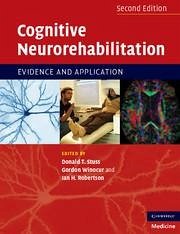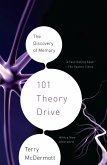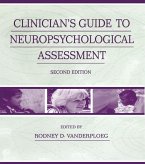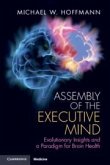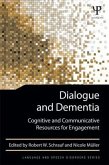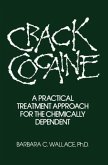Cognitive Neurorehabilitation
Evidence and Application
Herausgeber: Stuss, Donald T; Robertson, Ian H; Winocur, Gordon
Cognitive Neurorehabilitation
Evidence and Application
Herausgeber: Stuss, Donald T; Robertson, Ian H; Winocur, Gordon
- Broschiertes Buch
- Merkliste
- Auf die Merkliste
- Bewerten Bewerten
- Teilen
- Produkt teilen
- Produkterinnerung
- Produkterinnerung
A newly revised, comprehensive reference for those interested in cognitive neurorehabilitation.
Andere Kunden interessierten sich auch für
![101 Theory Drive 101 Theory Drive]() Terry Mcdermott101 Theory Drive15,99 €
Terry Mcdermott101 Theory Drive15,99 €![Clinician's Guide To Neuropsychological Assessment Clinician's Guide To Neuropsychological Assessment]() Clinician's Guide To Neuropsychological Assessment119,99 €
Clinician's Guide To Neuropsychological Assessment119,99 €![Handbook of Frontal Lobe Assessment Handbook of Frontal Lobe Assessment]() Sarah E MacPhersonHandbook of Frontal Lobe Assessment125,99 €
Sarah E MacPhersonHandbook of Frontal Lobe Assessment125,99 €![Assembly of the Executive Mind Assembly of the Executive Mind]() Michael W HoffmannAssembly of the Executive Mind72,99 €
Michael W HoffmannAssembly of the Executive Mind72,99 €![Dialogue and Dementia Dialogue and Dementia]() Dialogue and Dementia94,99 €
Dialogue and Dementia94,99 €![Neuropsychology of Cardiovascular Disease Neuropsychology of Cardiovascular Disease]() Neuropsychology of Cardiovascular Disease109,99 €
Neuropsychology of Cardiovascular Disease109,99 €![Crack Cocaine Crack Cocaine]() Barbara C WallaceCrack Cocaine69,99 €
Barbara C WallaceCrack Cocaine69,99 €-
-
-
A newly revised, comprehensive reference for those interested in cognitive neurorehabilitation.
Hinweis: Dieser Artikel kann nur an eine deutsche Lieferadresse ausgeliefert werden.
Hinweis: Dieser Artikel kann nur an eine deutsche Lieferadresse ausgeliefert werden.
Produktdetails
- Produktdetails
- Verlag: Cambridge University Press
- 2nd Revised edition
- Seitenzahl: 620
- Erscheinungstermin: 14. Juni 2010
- Englisch
- Abmessung: 244mm x 189mm x 32mm
- Gewicht: 1333g
- ISBN-13: 9780521691857
- ISBN-10: 0521691850
- Artikelnr.: 29006668
- Herstellerkennzeichnung
- Produktsicherheitsverantwortliche/r
- Europaallee 1
- 36244 Bad Hersfeld
- gpsr@libri.de
- Verlag: Cambridge University Press
- 2nd Revised edition
- Seitenzahl: 620
- Erscheinungstermin: 14. Juni 2010
- Englisch
- Abmessung: 244mm x 189mm x 32mm
- Gewicht: 1333g
- ISBN-13: 9780521691857
- ISBN-10: 0521691850
- Artikelnr.: 29006668
- Herstellerkennzeichnung
- Produktsicherheitsverantwortliche/r
- Europaallee 1
- 36244 Bad Hersfeld
- gpsr@libri.de
Preface; Part I. Principles of Cognitive Neurorehabilitation: Introduction
to Part I George Winocur; 1. Principles of neuroplasticity and behaviour
Bryan Kolb and Robbin Gibb; 2. Principles of compensation in cognitive
neuroscience and neurorehabilitation Roger A. Dixon, Douglas D. Garrett and
Lars Bäckman; 3. The patient as a moving target - the importance to
rehabilitation of understanding variability Donald T. Stuss and Malcolm A.
Binns; 4. Steroids and allostasis in brain plasticity Richard G. Hunter and
Bruce S. McEwan; 5. Principles in conducting rehabilitation research Amy D.
Rodriguez and Leslie J. Gonzalez Rothi; 6. Outcome measurement in cognitive
neurorehabilitation Nadina Lincoln and Roshan das Nair; 7. Principles in
evaluating cognitive rehabilitation research Keith D. Cicerone; Part II.
Application of Imaging Technologies: Introduction to Part II Donald T.
Stuss; 8. Structural neuroimaging - defining the cerebral context for
cognitive rehabilitation Joel Ramirez, Fu Qiang Gao and Sandra E. Black; 9.
Functional neuroimaging and cognitive rehabilitation - healthy aging as a
model of plasticity Cheryl Grady; 10. Functional brain imaging and
neurological recovery Maurizio Corbetta; 11. The role of neuroelectric and
neuromagnetic recordings in assessing learning and rehabilitation effects
Claude Alain and Bernhard Ross; Part III. Factors Affecting Successful
Outcome: Introduction to Part III Ian H. Robertson; 12. Mood, affect and
motivation in rehabilitation Omar Ghaffar and Anthony Feinstein; 13.
Anosognosia and the process and outcome of neurorehabilitation George P.
Prigatano; 14. Psychosocial considerations for cognitive rehabilitation
Deirdre R. Dawson and George Winocur; 15. Exercise, cognition, and dementia
Erik Scherder and Laura Eggermont; 16. Is there a role for diet in
cognitive rehabilitation? Matthew Parrott and Carol E. Greenwood; Part IV.
Pharmacological and Biological Approaches: Introduction to Part IV George
Winocur; 17. Pharmacologic approaches to cognitive rehabilitation Thomas W.
McAllister and Amy F. T. Arnsten; 18. Pharmacologic treatment of cognitive
impairment after traumatic brain injury John Whyte; 19. Pharmacological
interventions for cognition in dementia John M. Ringman and Jeffrey L.
Cummings; 20. Neurogenesis-based regeneration in the adult brain, is it
feasible? J. Martin Wojtowicz; 21. The impact of cerebral small vessel
disease on cognitive impairment Harry Vinters and S. Thomas Carmichael; 22.
Intrinsic and extrinsic neural stem cell treatment of central nervous
system injury and disease Trudi Stickland, Samuel Weiss and Bryan Kolb;
Part V. Behavioural/Neuropsychological Approaches: Introduction to Part V
Ian H. Robertson and Donald T. Stuss; 23. The use of constraint-induced
movement therapy (CI therapy) to promote motor recovery following stroke
David Morris and Edward Taub; 24. Effects of physical activity on cognition
and brain Arthur Kramer, Kirk Erickson and Edward McAuley; 25. Aphasia
Susan A. Leon, Stephen Nadeau, Michael de Riesthal, Bruce Crosson, John C.
Rosenbek and Leslie J. Gonzalez Rothi; 26. Rehabilitation of neglect
Victoria Singh-Curry and Masud Husain; 27. Rehabilitation of frontal lobe
functions Brian Levine, Gary R. Turner and Donald T. Stuss; 28. Executive
functioning in children with traumatic brain injury in comparison to
developmental ADHD Gerri Hanten and Brian Levine; 29. Rehabilitation of
attention following traumatic brain injury Jennie Ponsford; 30. Memory
rehabilitation for people with brain injury Barbara A. Wilson and Narinder
Kapur; 31. Memory rehabilitation in older adults Elizabeth L. Glisky and
Martha Glisky; Part VI. Overview: 32. The future of cognitive
neurorehabilitation Ian H. Robertson and Susan M. Fitzpatrick.
to Part I George Winocur; 1. Principles of neuroplasticity and behaviour
Bryan Kolb and Robbin Gibb; 2. Principles of compensation in cognitive
neuroscience and neurorehabilitation Roger A. Dixon, Douglas D. Garrett and
Lars Bäckman; 3. The patient as a moving target - the importance to
rehabilitation of understanding variability Donald T. Stuss and Malcolm A.
Binns; 4. Steroids and allostasis in brain plasticity Richard G. Hunter and
Bruce S. McEwan; 5. Principles in conducting rehabilitation research Amy D.
Rodriguez and Leslie J. Gonzalez Rothi; 6. Outcome measurement in cognitive
neurorehabilitation Nadina Lincoln and Roshan das Nair; 7. Principles in
evaluating cognitive rehabilitation research Keith D. Cicerone; Part II.
Application of Imaging Technologies: Introduction to Part II Donald T.
Stuss; 8. Structural neuroimaging - defining the cerebral context for
cognitive rehabilitation Joel Ramirez, Fu Qiang Gao and Sandra E. Black; 9.
Functional neuroimaging and cognitive rehabilitation - healthy aging as a
model of plasticity Cheryl Grady; 10. Functional brain imaging and
neurological recovery Maurizio Corbetta; 11. The role of neuroelectric and
neuromagnetic recordings in assessing learning and rehabilitation effects
Claude Alain and Bernhard Ross; Part III. Factors Affecting Successful
Outcome: Introduction to Part III Ian H. Robertson; 12. Mood, affect and
motivation in rehabilitation Omar Ghaffar and Anthony Feinstein; 13.
Anosognosia and the process and outcome of neurorehabilitation George P.
Prigatano; 14. Psychosocial considerations for cognitive rehabilitation
Deirdre R. Dawson and George Winocur; 15. Exercise, cognition, and dementia
Erik Scherder and Laura Eggermont; 16. Is there a role for diet in
cognitive rehabilitation? Matthew Parrott and Carol E. Greenwood; Part IV.
Pharmacological and Biological Approaches: Introduction to Part IV George
Winocur; 17. Pharmacologic approaches to cognitive rehabilitation Thomas W.
McAllister and Amy F. T. Arnsten; 18. Pharmacologic treatment of cognitive
impairment after traumatic brain injury John Whyte; 19. Pharmacological
interventions for cognition in dementia John M. Ringman and Jeffrey L.
Cummings; 20. Neurogenesis-based regeneration in the adult brain, is it
feasible? J. Martin Wojtowicz; 21. The impact of cerebral small vessel
disease on cognitive impairment Harry Vinters and S. Thomas Carmichael; 22.
Intrinsic and extrinsic neural stem cell treatment of central nervous
system injury and disease Trudi Stickland, Samuel Weiss and Bryan Kolb;
Part V. Behavioural/Neuropsychological Approaches: Introduction to Part V
Ian H. Robertson and Donald T. Stuss; 23. The use of constraint-induced
movement therapy (CI therapy) to promote motor recovery following stroke
David Morris and Edward Taub; 24. Effects of physical activity on cognition
and brain Arthur Kramer, Kirk Erickson and Edward McAuley; 25. Aphasia
Susan A. Leon, Stephen Nadeau, Michael de Riesthal, Bruce Crosson, John C.
Rosenbek and Leslie J. Gonzalez Rothi; 26. Rehabilitation of neglect
Victoria Singh-Curry and Masud Husain; 27. Rehabilitation of frontal lobe
functions Brian Levine, Gary R. Turner and Donald T. Stuss; 28. Executive
functioning in children with traumatic brain injury in comparison to
developmental ADHD Gerri Hanten and Brian Levine; 29. Rehabilitation of
attention following traumatic brain injury Jennie Ponsford; 30. Memory
rehabilitation for people with brain injury Barbara A. Wilson and Narinder
Kapur; 31. Memory rehabilitation in older adults Elizabeth L. Glisky and
Martha Glisky; Part VI. Overview: 32. The future of cognitive
neurorehabilitation Ian H. Robertson and Susan M. Fitzpatrick.
Preface; Part I. Principles of Cognitive Neurorehabilitation: Introduction
to Part I George Winocur; 1. Principles of neuroplasticity and behaviour
Bryan Kolb and Robbin Gibb; 2. Principles of compensation in cognitive
neuroscience and neurorehabilitation Roger A. Dixon, Douglas D. Garrett and
Lars Bäckman; 3. The patient as a moving target - the importance to
rehabilitation of understanding variability Donald T. Stuss and Malcolm A.
Binns; 4. Steroids and allostasis in brain plasticity Richard G. Hunter and
Bruce S. McEwan; 5. Principles in conducting rehabilitation research Amy D.
Rodriguez and Leslie J. Gonzalez Rothi; 6. Outcome measurement in cognitive
neurorehabilitation Nadina Lincoln and Roshan das Nair; 7. Principles in
evaluating cognitive rehabilitation research Keith D. Cicerone; Part II.
Application of Imaging Technologies: Introduction to Part II Donald T.
Stuss; 8. Structural neuroimaging - defining the cerebral context for
cognitive rehabilitation Joel Ramirez, Fu Qiang Gao and Sandra E. Black; 9.
Functional neuroimaging and cognitive rehabilitation - healthy aging as a
model of plasticity Cheryl Grady; 10. Functional brain imaging and
neurological recovery Maurizio Corbetta; 11. The role of neuroelectric and
neuromagnetic recordings in assessing learning and rehabilitation effects
Claude Alain and Bernhard Ross; Part III. Factors Affecting Successful
Outcome: Introduction to Part III Ian H. Robertson; 12. Mood, affect and
motivation in rehabilitation Omar Ghaffar and Anthony Feinstein; 13.
Anosognosia and the process and outcome of neurorehabilitation George P.
Prigatano; 14. Psychosocial considerations for cognitive rehabilitation
Deirdre R. Dawson and George Winocur; 15. Exercise, cognition, and dementia
Erik Scherder and Laura Eggermont; 16. Is there a role for diet in
cognitive rehabilitation? Matthew Parrott and Carol E. Greenwood; Part IV.
Pharmacological and Biological Approaches: Introduction to Part IV George
Winocur; 17. Pharmacologic approaches to cognitive rehabilitation Thomas W.
McAllister and Amy F. T. Arnsten; 18. Pharmacologic treatment of cognitive
impairment after traumatic brain injury John Whyte; 19. Pharmacological
interventions for cognition in dementia John M. Ringman and Jeffrey L.
Cummings; 20. Neurogenesis-based regeneration in the adult brain, is it
feasible? J. Martin Wojtowicz; 21. The impact of cerebral small vessel
disease on cognitive impairment Harry Vinters and S. Thomas Carmichael; 22.
Intrinsic and extrinsic neural stem cell treatment of central nervous
system injury and disease Trudi Stickland, Samuel Weiss and Bryan Kolb;
Part V. Behavioural/Neuropsychological Approaches: Introduction to Part V
Ian H. Robertson and Donald T. Stuss; 23. The use of constraint-induced
movement therapy (CI therapy) to promote motor recovery following stroke
David Morris and Edward Taub; 24. Effects of physical activity on cognition
and brain Arthur Kramer, Kirk Erickson and Edward McAuley; 25. Aphasia
Susan A. Leon, Stephen Nadeau, Michael de Riesthal, Bruce Crosson, John C.
Rosenbek and Leslie J. Gonzalez Rothi; 26. Rehabilitation of neglect
Victoria Singh-Curry and Masud Husain; 27. Rehabilitation of frontal lobe
functions Brian Levine, Gary R. Turner and Donald T. Stuss; 28. Executive
functioning in children with traumatic brain injury in comparison to
developmental ADHD Gerri Hanten and Brian Levine; 29. Rehabilitation of
attention following traumatic brain injury Jennie Ponsford; 30. Memory
rehabilitation for people with brain injury Barbara A. Wilson and Narinder
Kapur; 31. Memory rehabilitation in older adults Elizabeth L. Glisky and
Martha Glisky; Part VI. Overview: 32. The future of cognitive
neurorehabilitation Ian H. Robertson and Susan M. Fitzpatrick.
to Part I George Winocur; 1. Principles of neuroplasticity and behaviour
Bryan Kolb and Robbin Gibb; 2. Principles of compensation in cognitive
neuroscience and neurorehabilitation Roger A. Dixon, Douglas D. Garrett and
Lars Bäckman; 3. The patient as a moving target - the importance to
rehabilitation of understanding variability Donald T. Stuss and Malcolm A.
Binns; 4. Steroids and allostasis in brain plasticity Richard G. Hunter and
Bruce S. McEwan; 5. Principles in conducting rehabilitation research Amy D.
Rodriguez and Leslie J. Gonzalez Rothi; 6. Outcome measurement in cognitive
neurorehabilitation Nadina Lincoln and Roshan das Nair; 7. Principles in
evaluating cognitive rehabilitation research Keith D. Cicerone; Part II.
Application of Imaging Technologies: Introduction to Part II Donald T.
Stuss; 8. Structural neuroimaging - defining the cerebral context for
cognitive rehabilitation Joel Ramirez, Fu Qiang Gao and Sandra E. Black; 9.
Functional neuroimaging and cognitive rehabilitation - healthy aging as a
model of plasticity Cheryl Grady; 10. Functional brain imaging and
neurological recovery Maurizio Corbetta; 11. The role of neuroelectric and
neuromagnetic recordings in assessing learning and rehabilitation effects
Claude Alain and Bernhard Ross; Part III. Factors Affecting Successful
Outcome: Introduction to Part III Ian H. Robertson; 12. Mood, affect and
motivation in rehabilitation Omar Ghaffar and Anthony Feinstein; 13.
Anosognosia and the process and outcome of neurorehabilitation George P.
Prigatano; 14. Psychosocial considerations for cognitive rehabilitation
Deirdre R. Dawson and George Winocur; 15. Exercise, cognition, and dementia
Erik Scherder and Laura Eggermont; 16. Is there a role for diet in
cognitive rehabilitation? Matthew Parrott and Carol E. Greenwood; Part IV.
Pharmacological and Biological Approaches: Introduction to Part IV George
Winocur; 17. Pharmacologic approaches to cognitive rehabilitation Thomas W.
McAllister and Amy F. T. Arnsten; 18. Pharmacologic treatment of cognitive
impairment after traumatic brain injury John Whyte; 19. Pharmacological
interventions for cognition in dementia John M. Ringman and Jeffrey L.
Cummings; 20. Neurogenesis-based regeneration in the adult brain, is it
feasible? J. Martin Wojtowicz; 21. The impact of cerebral small vessel
disease on cognitive impairment Harry Vinters and S. Thomas Carmichael; 22.
Intrinsic and extrinsic neural stem cell treatment of central nervous
system injury and disease Trudi Stickland, Samuel Weiss and Bryan Kolb;
Part V. Behavioural/Neuropsychological Approaches: Introduction to Part V
Ian H. Robertson and Donald T. Stuss; 23. The use of constraint-induced
movement therapy (CI therapy) to promote motor recovery following stroke
David Morris and Edward Taub; 24. Effects of physical activity on cognition
and brain Arthur Kramer, Kirk Erickson and Edward McAuley; 25. Aphasia
Susan A. Leon, Stephen Nadeau, Michael de Riesthal, Bruce Crosson, John C.
Rosenbek and Leslie J. Gonzalez Rothi; 26. Rehabilitation of neglect
Victoria Singh-Curry and Masud Husain; 27. Rehabilitation of frontal lobe
functions Brian Levine, Gary R. Turner and Donald T. Stuss; 28. Executive
functioning in children with traumatic brain injury in comparison to
developmental ADHD Gerri Hanten and Brian Levine; 29. Rehabilitation of
attention following traumatic brain injury Jennie Ponsford; 30. Memory
rehabilitation for people with brain injury Barbara A. Wilson and Narinder
Kapur; 31. Memory rehabilitation in older adults Elizabeth L. Glisky and
Martha Glisky; Part VI. Overview: 32. The future of cognitive
neurorehabilitation Ian H. Robertson and Susan M. Fitzpatrick.

